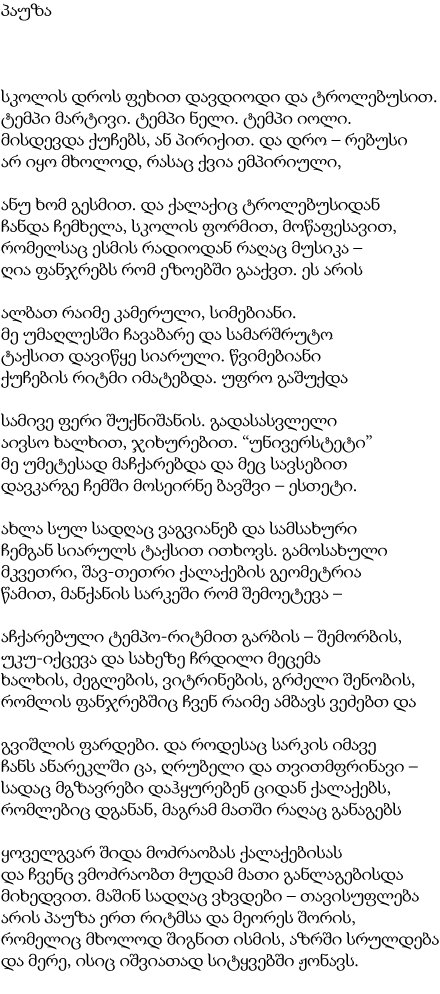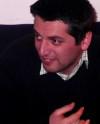Poem
Rati Amaghlobeli
PAUSE
I used to go to school on foot and by trolley-bus.
Simple time. Slow tempo. Ad lib tempo.
It followed the streets, or vice versa. And time
Was not just a rebus, which is called empirical,
Or you understand. And the town, too, from a trolley-bus
Seemed to be my size, school-shaped, like a pupil
Who hears some music on the radio –
Carried through the open window to the yard. This is
Probably some chamber piece, for strings.
I passed out top and took to travelling
By fixed-route taxi. The rainy
Streets’ rhythms gathered pace. The three colours
Of the traffic lights shone more. The pedestrian crossing
Filled with people, with watchmen’s huts. ‘University’
I hurried mostly, and I completely
Lost the strolling child, the aesthete.
Now I’m always late for something, and work
Demands I take taxis. The precise black and white
Geometry, as depicted, of the city –
Contained for a moment in the car mirror –
In accelerated rhythm and tempo runs away, runs in,
Turns back and strikes my face as a shadow
Of people, monuments, shop windows, a long building
In whose windows we seek some story,
And disturbs our curtains. And when in the same mirror
The sky is reflected, with a cloud and an aeroplane,
Where travellers look down at cities from the air,
Which stand, but in them something governs
All sorts of inner motion of the cities,
And we move constantly with regard to its lay-out.
Thus somewhere I realise – freedom
Is a pause between one rhythm and another,
Which can only be heard inwardly, is achieved in thoughts
And then so rarely oozes out in words.
© Translation: 2007, Donald Rayfield
PAUZE
Toen ik schoolging reisde ik te voet of met de trolleybus.Eenvoudig ritme. Traag ritme. Makkelijk ritme.
Het dreef de straten als schapen voor zich uit of omgekeerd.
En tijd las niet enkel als een empirische rebus.
Vanuit de bus leek de stad niet groter dan mezelf,
een leerling in schooluniform, uit het gewelf
van een binnenplaats klonk elke dag muziek
uit de radio. Het klonk klassiek,
wellicht een kamerorkest op snaarinstrumenten.
Ik schreef me in aan de universiteit en stapte
over op de minibus. Het ritme van de regenachtige straten
nam toe. De drie kleuren van de verkeerslichten
gingen scherper oplichten en sneller flitsen. In die vaart
slibden voetgangerstunnels dicht met mensen en stalletjes.
De universiteit joeg me op als sporen een paard
en het wandelende kind in me verdwaalde, en met hem de estheet.
Nu kom ik altijd overal te laat en mijn baas
verlangt van me dat ik me met taxi’s verplaats.
In de autospiegel vang ik een secondelang de strakke,
zwart-witte geometrie op van de stad in vlakken.
Met verhoogde snelheid komt die stad op me af, doorboort me,
maakt rechtsomkeer en slaat een schaduw over mijn gezicht
van mensen, standbeelden, etalages, lange gebouwen
met ramen die op nieuws staan gericht,
maar de gordijnen storen. En als in die spiegel plots
de hemel, wolken en een vliegtuig opduiken,
en ik voel hoe de passagiers op onze stad neerkijken
waarin voor hen elke innerlijke beweging stokt
maar wij toch volgens het stadsplan bewegen,
dan weet ik dat vrijheid tussen twee ritmes de pauze is,
die in je binnenste sporen achterlaat
en in je gedachten ontstaat
maar zelden zoekt naar woorden.
© Vertaling: 2007, Ingrid Degraeve

© 2004, Rati Amaghlobeli
From: wre (‘circle’)
Publisher: Siesta, Tbilisi
From: wre (‘circle’)
Publisher: Siesta, Tbilisi
Poems
Poems of Rati Amaghlobeli
Close
PAUSE
I used to go to school on foot and by trolley-bus.
Simple time. Slow tempo. Ad lib tempo.
It followed the streets, or vice versa. And time
Was not just a rebus, which is called empirical,
Or you understand. And the town, too, from a trolley-bus
Seemed to be my size, school-shaped, like a pupil
Who hears some music on the radio –
Carried through the open window to the yard. This is
Probably some chamber piece, for strings.
I passed out top and took to travelling
By fixed-route taxi. The rainy
Streets’ rhythms gathered pace. The three colours
Of the traffic lights shone more. The pedestrian crossing
Filled with people, with watchmen’s huts. ‘University’
I hurried mostly, and I completely
Lost the strolling child, the aesthete.
Now I’m always late for something, and work
Demands I take taxis. The precise black and white
Geometry, as depicted, of the city –
Contained for a moment in the car mirror –
In accelerated rhythm and tempo runs away, runs in,
Turns back and strikes my face as a shadow
Of people, monuments, shop windows, a long building
In whose windows we seek some story,
And disturbs our curtains. And when in the same mirror
The sky is reflected, with a cloud and an aeroplane,
Where travellers look down at cities from the air,
Which stand, but in them something governs
All sorts of inner motion of the cities,
And we move constantly with regard to its lay-out.
Thus somewhere I realise – freedom
Is a pause between one rhythm and another,
Which can only be heard inwardly, is achieved in thoughts
And then so rarely oozes out in words.
© 2007, Donald Rayfield
From: wre (‘circle’)
From: wre (‘circle’)
PAUSE
I used to go to school on foot and by trolley-bus.
Simple time. Slow tempo. Ad lib tempo.
It followed the streets, or vice versa. And time
Was not just a rebus, which is called empirical,
Or you understand. And the town, too, from a trolley-bus
Seemed to be my size, school-shaped, like a pupil
Who hears some music on the radio –
Carried through the open window to the yard. This is
Probably some chamber piece, for strings.
I passed out top and took to travelling
By fixed-route taxi. The rainy
Streets’ rhythms gathered pace. The three colours
Of the traffic lights shone more. The pedestrian crossing
Filled with people, with watchmen’s huts. ‘University’
I hurried mostly, and I completely
Lost the strolling child, the aesthete.
Now I’m always late for something, and work
Demands I take taxis. The precise black and white
Geometry, as depicted, of the city –
Contained for a moment in the car mirror –
In accelerated rhythm and tempo runs away, runs in,
Turns back and strikes my face as a shadow
Of people, monuments, shop windows, a long building
In whose windows we seek some story,
And disturbs our curtains. And when in the same mirror
The sky is reflected, with a cloud and an aeroplane,
Where travellers look down at cities from the air,
Which stand, but in them something governs
All sorts of inner motion of the cities,
And we move constantly with regard to its lay-out.
Thus somewhere I realise – freedom
Is a pause between one rhythm and another,
Which can only be heard inwardly, is achieved in thoughts
And then so rarely oozes out in words.
© 2007, Donald Rayfield
Sponsors

























